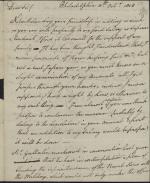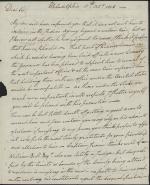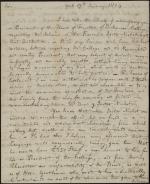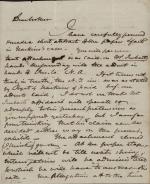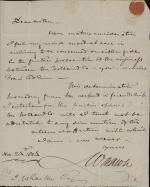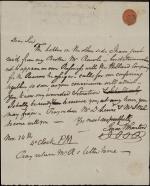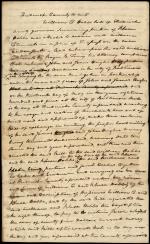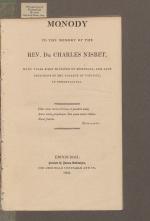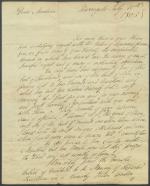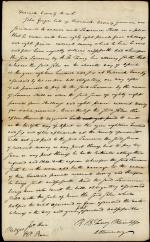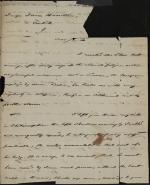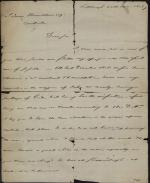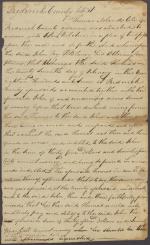About Full-Text Documents
Collections of college and personal papers, as well as a select number of individual documents, have been briefly described in entries available for browsing and searching on this site. All collection and document descriptions contain a representative image and a summary of the contents.
Search Document Descriptions
Browse Document Descriptions
August 29, 1803
Joseph Priestley Jr. writes to John Smith of Philadelphia (102 S. 18th St.) after receiving reports that Mr. Dean's tract of land is on a mountain top and not worth surveying.
Format: Letters/Correspondence
Location: MC 1998.1, B1, F12
Subject: Land and Real Estate
Time Period: 1800-1819
October 10, 1803
William Irvine, who writes from Philadelphia, explains to Secretary of War Henry Dearborn that his salary as Superintendent of Military Stores is "too small for the support of my family."
Format: Letters/Correspondence
Location: I-Purchase-1956-24
Subject: Economics and Finance, Military Affairs and Conflict, Politics and Government
Time Period: 1800-1819
View Item: Letter from William Irvine to Henry Dearborn
October 15, 1803
William Irvine writes Secretary of War Henry Dearborn and explains why his son resigned from the Indian Agency. Pennsylvania Governor Thomas McKean appointed Irvine’s son "to several of the most important offices" in a new county and "at the same time informed him that holding them with an office under the United States would be incompatible," as Irvine notes. Irvine also suggests replacements, including a William Bell. "Mr. Bell," as Irvine explains, "is a respectable man and a good Republican." Transcript included.
Format: Letters/Correspondence
Location: I-Friends-1975-25
Subject: Military Affairs and Conflict, Native Americans, Politics and Government
Time Period: 1800-1819
View Item: Letter from William Irvine to Henry Dearborn
December 26, 1803
Joseph Priestley sends instructions for printing his manuscript (Index to the Bible) and orders several copies of his Church History and Lectures. Priestley also tells John Vaughan that he is out of oysters. While "the oysters have been of great service to me," Priestley notes that "towards the last they were very stale." Transcript included.
Format: Letters/Correspondence
Location: I-NeffG-1956-1
Subject: Literary Pursuits, Personal and Family Life
Time Period: 1800-1819
View Item: Letter from Joseph Priestley to John Vaughan
1804
Joseph Priestley writes to Joseph Barrington a few days before his death on February 6, 1804 about his views on Christianity. Almost thirty years later, the National Gazette and Literary Register prints Priestley's letter on November 13, 1833.
Format: Letters/Correspondence, Newspapers and Magazines
Location: OC 1998.1, F1
Subject: Religion and Spirituality
Time Period: 1800-1819
View Item: Letter from Joseph Priestley to Joseph Berrington
January 17, 1804
Ralph Bowie writes to John Montgomery, the President of the Board of Trustees of Dickinson College, in an attempt to settle Dr. Charles Nisbet's claims against the College. Transcript included.
Format: Letters/Correspondence
Location: I-ValeM-1947-14
Subject: Dickinson College Administration, Dickinson College History, Economics and Finance, Education
Time Period: 1800-1819
View Item: Letter from Ralph Bowie to John Montgomery
January 30, 1804
James McKenzie writes a letter to President Charles Nisbet expressing apprehension over a potential invasion of Great Britain by France, and the precautions taken against it. "Our fleets are as formidable as our armies, and watch the motions of the French so closely, that they cannot get out of their ports," as McKenzie explains. McKenzie also shares comments on news of a French defeat in the Caribbean. McKenzie notes that "it affords much please here at present to hear that the French have been obliged to evacuate St. Domingo, and that the remains of their army... have fallen into our hands." In addition, McKenzie expresses sorrow at Nisbet's dissatisfaction with his position as President of Dickinson College and shares news regarding the Scottish church's local affairs. Transcript included.
Format: Letters/Correspondence
Location: MC 2001.7, B1, F4
Subject: Dickinson College Administration, Dickinson College History, International Affairs, Military Affairs and Conflict, Personal and Family Life, Religion and Spirituality
Time Period: 1800-1819
View Item: Letter from James McKenzie to Charles Nisbet
November 14, 1804
Attorney William Rawle writes to Isaac Wharton and discusses a legal case. "His claim can be decided either way on the present exhibits," as Rawle explains.
Format: Letters/Correspondence
Location: I-Friends-1973-7
Subject: Legal Affairs
Time Period: 1800-1819
View Item: Letter from William Rawle to Isaac Wharton
November 24, 1804
Attorney William Rawle writes to Isaac Wharton and explains his decision to not take sides in the prosecution of the Holland Company. The reverse side of the document includes a separate letter from Isaac Wharton to Robert Waln, in which Wharton discusses Rawle's refusal to help the Holland Company.
Format: Letters/Correspondence
Location: I-Friends-1973-7
Subject: Legal Affairs
Time Period: 1800-1819
View Item: Letter from William Rawle to Isaac Wharton
November 24, 1804
Isaac Wharton writes to Robert Waln and discusses attorney William Rawle's decision to note take sides in the prosecution of the Holland Company. The reverse side of the document includes a separate letter from William Rawle to Isaac Wharton, in which Rawle explains his refusal to help the Holland Company.
Format: Letters/Correspondence
Location: I-Friends-1973-7
Subject: Legal Affairs
Time Period: 1800-1819
View Item: Letter from Isaac Wharton to Robert Waln
circa 1805
Attorney Roger Brooke Taney addresses this legal document to the Judges of Frederick County Court regarding the case of William Clements v. Rhesa Hobbs. Taney represents the prosecution.
Format: Legal and Government Documents
Location: I-BeachW-1971-3
Subject: Legal Affairs
Time Period: 1800-1819
1805
Charles Keith publishes this item a year after the death of Dr. Charles Nisbet.
Note: See Related Entries for a link to Keith's letter to Anne Nisbet on July 11, 1805.
Format: Books and Pamphlets
Location: DC P N723K
Subject: Personal and Family Life
Time Period: 1800-1819
View Item: "Monody to the Memory of the Rev. Dr. Charles Nisbet," by Charles Keith
May 2, 1805
Roger Brooke Taney, who serves as the plaintiff's attorney, writes this legal document about a case (Moses Wright vs. Martin Garber and Adam Fingbone) that involves collecting a debt. Wright wants the court to order Garber and Fingbone, two "yeomen", to pay him "forty five Dollars specie." Transcript included.
Format: Legal and Government Documents
Location: I-BeachW-2010-3
Subject: Economics and Finance, Legal Affairs
Time Period: 1800-1819
View Item: Legal Document, Moses Wright v. Martin Garber and Adam Fingbone
May 4, 1805
Benjamin Rush responds to his son, Dr. John Rush's request for money to help him settle in Charleston, South Carolina. Benjamin responds that he is unable to furnish his son due to economic difficulties, including the upkeep for his other sons: James, Ben, and Richard who "is still unable to maintain himself." He also states that "My receipts of money have been much less than in former years," owing in part to an economic downturn. Benjamin goes on to advise his son to proceed in his settlement, despite being unable to assist him, and also encourages him to pursue medicine.
In addition, Benjamin describes "a number of queries from the governments of Etrusia in Italy, and of Prussia" about "the origin and means of preventing the yellow fever." Benjamin also notes that his account on this disease has been translated into Spanish. Transcript included.
Format: Letters/Correspondence
Location: I-Friends-undated-4
Subject: Business and Industry, Health and Medicine, Personal and Family Life
Time Period: 1800-1819
View Item: Letter from Benjamin Rush to John Rush
July 11, 1805
Charles Keith writes to Anne Nisbet regarding the death of her husband. "One of the best of Men is forever lost to his Friends and Mankind," as Keith observes. Keith also explains his decision to write Monody to the Memory of the Rev. Dr Charles Nisbet and asks that the Nisbet family "forgive the Errors and Defects" in that publication.
James Paton also writes Mrs. Nisbet to express condolences and share news about friends in Scotland. "I take the opportunity of Dr. Keiths letter to express my condolence with you and your family upon the loss of so worthy a husband," as Paton notes. Charles Nisbet died on January 18, 1804. Transcript included.
Format: Letters/Correspondence
Location: I-TurnbullM-undated-1
Subject: Literary Pursuits, Personal and Family Life
Time Period: 1800-1819
View Item: Letter from Charles Keith to Anne Nisbet
circa 1806
Attorney Roger Brooke Taney addresses this legal document to the Judges of Frederick County Court regarding the case of Lawrence Shell v. John Geiger. Taney represents the prosecution.
Format: Legal and Government Documents
Location: I-BeachW-1971-3
Subject: Legal Affairs
Time Period: 1800-1819
March 19, 1806
William Turnbull writes to Alexander Nisbet inquiring as to whether he had informed a W. Bowie of the particulars of a new account with the Trustees of Dickinson. Turnbull also invites Nisbet to the christening of his son. Transcript included.
Format: Letters/Correspondence
Location: MC 2001.7, B1, F42
Subject: Dickinson College Administration, Dickinson College History, Personal and Family Life
Time Period: 1800-1819
September 24, 1806
Joseph St. Leger d'Happart writes to James Hamilton about travelling from Carlisle to Pittsburgh as well as business during the trip.
Format: Letters/Correspondence
Location: I-ValeM-1948-1
Subject: Business and Industry, Travel and Tourism
Time Period: 1800-1819
View Item: Letter from Joseph St. Leger d'Happart to James Hamilton
November 27, 1806
Joseph St. Leger d'Happart writes to James Hamilton, , a lawyer and member of the Dickinson College Board of Trustees, about various business affairs.
Format: Letters/Correspondence
Location: I-ValeM-1948-1
Subject: Business and Industry
Time Period: 1800-1819
View Item: Letter from Joseph St. Leger d'Happart to James Hamilton
February 16, 1807
Attorney Roger Brooke Taney writes this note to an unspecified Mr. Ritchie on the case Philip Six v. Frederick Forney.
Format: Letters/Correspondence
Location: I-KeatleyG-1971-1
Subject: Legal Affairs
Time Period: 1800-1819
February 27, 1807 - circa 1809
Three legal documents, including an arrest warrant for Thomas Noland, regarding the case of John Ritchie v. Thomas Noland for an unpaid debt. Roger Brooke Taney serves as John Ritchie's attorney.
Format: Legal and Government Documents
Location: I-SpahrB-1965-1
Subject: Economics and Finance, Legal Affairs
Time Period: 1800-1819
June 15, 1807
James Hamilton Sr. uses this letter of attorney to provide John Vaughan of Philadelphia with the legal authority to lease or sell lands that the Commonwealth of Pennsylvania has granted to Pennsylvania's officers and soldiers. Hamilton signs this document on June 15, 1807 in Charleston, South Carolina and it is witnessed by Jared Bunce, William Payne, John Dawson, and H. H. Brackenridge.
This document is filed in the Office for Recording of Deeds of two Pennsylvania counties - Mercer County on December 3, 1807 and Venango County on January 8, 1808.
Format: Legal and Government Documents
Location: I-Friends-1975-13
Subject: Land and Real Estate, Legal Affairs
Time Period: 1800-1819
View Item: Letter of Attorney from James Hamilton to John Vaughan
July 23, 1807
Roger Brooke Taney, who serves as the plaintiffs' attorney, writes this legal brief for the case Jonathan William Levy, Sarah Levy, John Leonard Levy, Maria Catharine Levy, and Anna Rebecca Charlotte Levy v. George Schnertzell. This case, which centers on a land dispute, also involves Richard Fenn and Simon Fenn. A note from Richard Fenn to George Schnertzell also appears on the last page of the brief.
Format: Legal and Government Documents
Location: I-SpahrB-1971-1
Subject: Land and Real Estate, Legal Affairs
Time Period: 1800-1819
View Item: Legal Document, Jonathan Levy et al. v. George Schnertzell
August 31, 1807
Joseph Priestley Jr. writes to Nicholas LeFevre about a proposed exchange of "my brick house in Northd." for lands in Catawissa.
Format: Letters/Correspondence
Location: MC 1998.1, B1, F12
Subject: Land and Real Estate, Personal and Family Life
Time Period: 1800-1819
View Item: Letter from Joseph Priestley Jr. to Nicholas LeFevre
November 16, 1807
John Dickinson writes to Attorney General Caesar Rodney discussing the implications of the United Kingdom's policies towards other countries. "The infatuated Policy of Britain has placed her in such a position, that she seems to think her safety depends on Hostility against the World," as Dickinson explains. Dickinson also argues that the United States is not prepared for a possible conflict and should make preparations. "We ought, among other Things, to have 15 or 20 Gunboats in the Delaware" since "a single Vessel might plunder and burn New Castle and this Town," as Dickinson notes. Transcript included.
Format: Letters/Correspondence
Location: MC 2001.13, B1, F4
Subject: International Affairs, Military Affairs and Conflict, Politics and Government
Time Period: 1800-1819
View Item: Letter from John Dickinson to Caesar Augustus Rodney


